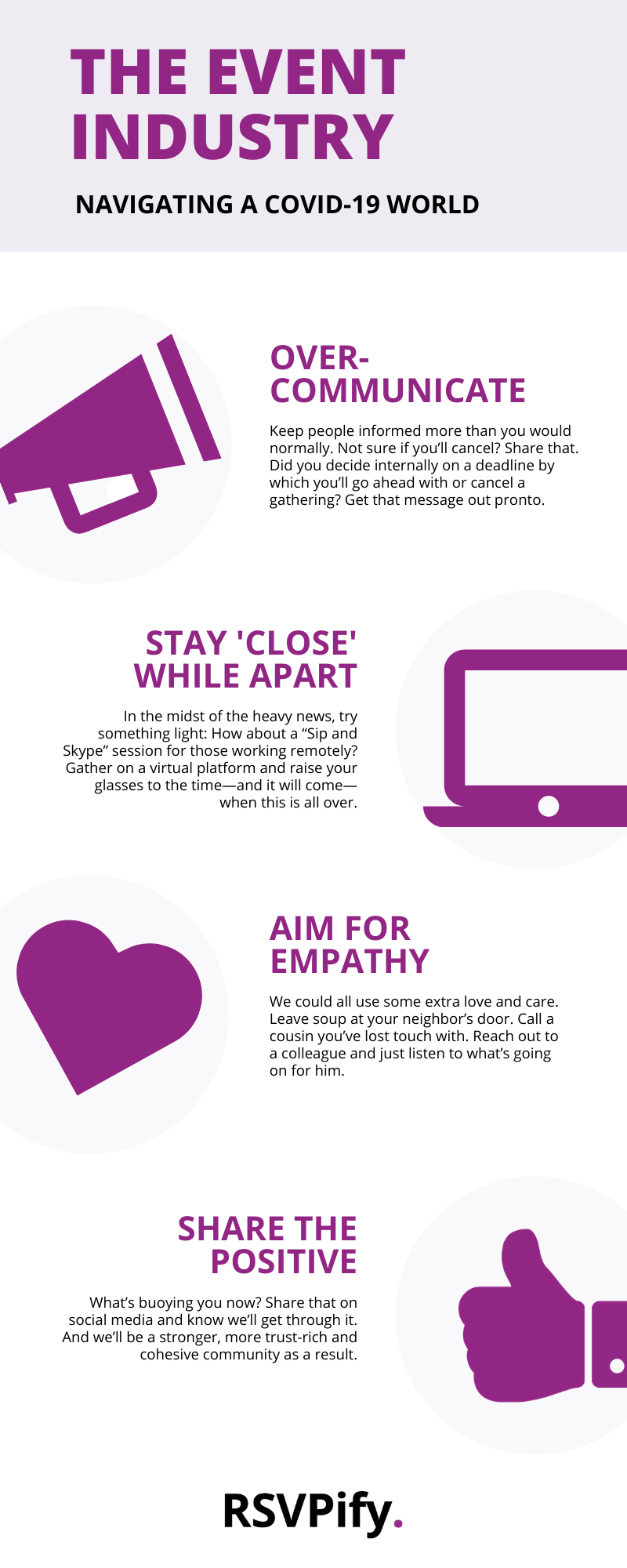18 Mar

Hosting Events In An Event-Free World (Part 1)
What do event management companies and event planners do now?
A few weeks ago, we published a blog post that broke down some of the challenges the event industry was facing as the coronavirus threat had just begun to be realized beyond China. At the time, the full impact on not only the event industry, but on most sectors of the economy had yet to be realized. Now, as billions of people around the world are confined to their homes, events as large as Euro 2020 and the Olympics are on the chopping block, and even US presidential primary elections are being postponed. At this point, it’s valid to wonder not just when, but if the events industry will return to its pre-virus form, especially as a global economic recession is now considered to be likely.
With this in mind, today we’re offering Part 1 of a series, Hosting Events in An Event-Free World, where we’ll look at the challenges facing the events industry now, some innovative solutions organizers and event planners are coming up with to move forward, and what the future might bring.
For the first installation of our series, we decided to reach out to event professional Andrea Driessen, founder of No More Boring Meetings (a speaker’s bureau and event design consultancy) and author of The Non-Obvious Guide to Event Planning, to get her take on how the event industry might move forward during these challenging times.
Tips for the Event Industry to Navigate A Covid-19 World
With the events industry at the center of the virus crisis—since it’s directly affected by travel disruption, social distancing, and community-driven large-event bans—Driessen acknowledges that the events industry is more challenged than some sectors. However, rather than lamenting our situation, in her opinion, “we can step up and be a highly visible example of cooperation, communication, and cohesion”.
Driessen further recommends that event organizers:
- Over-communicate to your audiences and stakeholders. Keep people informed more than you would normally. Not sure if you’ll cancel? Share that. Did you decide internally on a deadline by which you’ll go ahead with or cancel a gathering? Get that message out pronto. In this vein, here are terrific tips for communicating virtually what you were going to deliver in person.
- Stay close while apart. In the midst of the heavy news, try something light: How about a “Sip and Skype” session for those working remotely? Crowdsource recipes for vitamin-rich beverages and/or tonic-rich cocktails, and then gather on a virtual platform and raise your glasses to the time—and it will come—when this is all over.
- Aim for empathy and transparency. Remember that while our businesses have certainly been impacted, we are not alone. There are a multitude of industries, especially in the services sector, that have grown to depend on the event industry for their survival. The long term viability of these industries is suddenly in question, something that is critical to keep in mind as this crisis evolves.
- What’s buoying you now? Share that on social media rather than incessantly watching the news.
- Know we’ll get through it. And we’ll be a stronger, more trust-rich and cohesive community as a result.
So What’s Next?
While there are plenty of unknowns, our next feature will look at some of the innovations and ideas that have already emerged from event professionals, and walk through some more tips for planning for the coming months and years in the industry.











